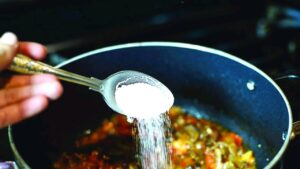
The Corporate Accountability and Public Participation Africa (CAPPA) has urged Nigerians to cut down on excessive salt intake, warning that it is a major driver of life-threatening illnesses….CONTINUE FULL READING>>>>>
The call was made during a “Salt Target and Front of Pack Warning Label (FOPWL) Journalism Training on Response Building” organised by CAPPA in Lagos, which drew about 50 journalists from online, print, and broadcast media.
In his welcome remarks, CAPPA Executive Director, Akinbode Oluwafemi, noted that more Nigerians are falling ill not from hunger but from what they eat.
“Illnesses like hypertension, diabetes, and stroke have become widespread, and much of this burden can be traced to what fills our plates. People are consuming heavily processed foods, high in salt and sugar, and poorly labelled,” he said.
Project Officer for Cardiovascular Health at CAPPA, Bukola Olukemi, described sugar, salt, and fats as “nutrients of concern,” noting that Nigerians are shifting from traditional diets to processed foods.
She stressed the need for stricter policies to compel food manufacturers to stay within healthy limits, as many labels and adverts remain deceptive.
Associate Director for Healthy Food Policy, Abayomi Sarumi, said CAPPA is strengthening its campaign through media outreach, community engagement, partnerships, and collaboration with the Federal Ministry of Health and the National Agency for Food and Drug Administration and Control (NAFDAC). He disclosed plans to produce radio jingles in Yoruba, Igbo, and Hausa, and invited religious groups to help raise awareness in their congregations.
Public health consultant, Dr Joseph Ekiyor, citing a World Health Organisation (WHO) report, said 1.6 billion lives could be saved annually through salt reduction, adding that excessive salt intake contributed to 43 million deaths in 2021.
He also warned against contradictory messaging by influencers who promote healthy eating while endorsing unhealthy products, urging consumers to read and verify food labels.
Tessy Maina of the Network for Health Equity and Development (NHED) explained that the Coalition for Healthy Food Advocacy was formed to harmonise demands and avoid duplicating efforts in the campaign.
CAPPA’s Media and Communication Officer, Robert Egbe, encouraged journalists to counter industry misinformation with credible sources such as the National Agency for Food and Drug Administration and Control (NAFDAC) and the Standards Organisation of Nigeria (SON), and to creatively reframe advocacy messages into newsworthy content that promotes healthy eating….CONTINUE FULL READING>>>>>


